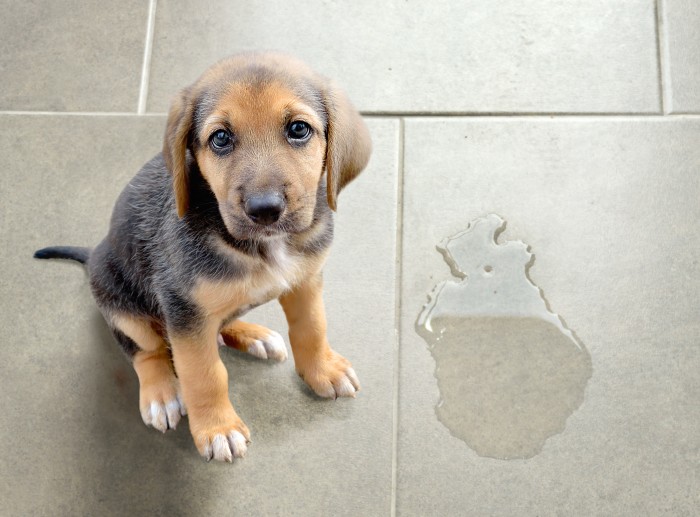Housebreaking Basics
By Michele Welton, Dog Trainer, Breed Selection Consultant, Author of 15 Dog Books

If owners could choose only one skill they wanted their dog to have, HOUSEBROKEN would probably be the winner.
The 2 major causes of housebreaking problems
The #1 cause is too much freedom in the house, too early.
The #2 cause is an improper housetraining routine.
- Maybe you let your pup loose in the yard to "go" on his own instead of taking him out on a leash, and staying out there with him until he goes, and then you can praise/reward him.
- Maybe you don't take him out frequently enough. Every 1-2 hours is best during the housebreaking period.
- Maybe you wander around the yard with him as he engages in a leisurely sniff-fest. Maybe you go for a walk with him. Both options distract the pup from focusing on doing his business.
Like anything else you're trying to teach your dog, housebreaking is a matter of creating a really good routine and sticking to it.
So let's start over. No matter how old your pup is, no matter how long the housebreaking issues have been going on, start implementing my housebreaking program right now as though your pup is new to your household.
Confinement and frequent access – the two keys to housebreaking
![]() Confinement so your dog can't "go" in the WRONG place.
Confinement so your dog can't "go" in the WRONG place.
Confinement means that until your pup is 100% housebroken, he is never allowed to walk freely around the house.
Confine a non-housebroken dog in a crate, a pen, or by using baby gates to section off a small space in a mudroom, laundry room, or kitchen.
He needs to stay in this space every minute of every hour of every day – unless you're sitting with him, playing with him, walking him, feeding him, grooming him, teaching him, or otherwise interacting with him. And at those times it would be wise to keep him on-leash so you can quickly control his behavior.
This is hard for most people, I know. It's so tempting to let the pup loose to run and play while you watch TV or fix dinner.
But if you let a non-housebroken dog, of any age, loose in the house when you're doing something else, even if you promise yourself that you'll "watch him", he can squat and do the deed MUCH more quickly than you can stop him. And voila, the bad habit is begun!
So if confinement is the first key to housebreaking, frequent (or constant) access to a potty area is the second key.
![]() Frequent (or constant) access to the RIGHT place to "go".
Frequent (or constant) access to the RIGHT place to "go".
 You have three options here:
You have three options here:
1) Take your pup outside every 2-3 hours.
2) Or install a doggy door so he can take himself outside into a small, enclosed "potty yard." (Don't do this if you're not home, else he might stay outside and drive your neighbors crazy with his barking.)
3) Or provide an indoor bathroom such as newspapers or (for very small dogs) a litter box.
Your dog must have SOMEWHERE accessible so he can "go" when he needs to go. Otherwise he will "go" wherever he happens to be at the time.... what else can he do, right? It's not his fault.
How long does it take to housebreak a dog?
There is no one answer to that, just as there isn't a typical length of time for toilet-training a toddler. Some pups catch on in a matter of weeks, while others take many months.
Here are some factors that can affect how quickly a dog is housebroken:
- how diligent you are about confining him during the housebreaking period so he can't "go" in the wrong places
- how frequently you take him to his potty area and praise/reward him when he eliminates there
- how regular his feeding schedule is
- his age
- his size and breed
- where you acquired him from
We've already talked about (1) and (2), so let's briefly cover those other factors on the list.
Feeding schedule can affect housebreaking.
 Don't leave food down for your pup to nibble at throughout the day.
Don't leave food down for your pup to nibble at throughout the day.
We talked about this in my article, Take charge of your pup's food. "Free feeding" (leaving food down) means your dog's digestive cycle becomes unpredictable, which makes housebreaking much more difficult.
Most puppies should eat three meals per day until 4 months old, then two meals per day thereafter.
Toy breed puppies (because they can have problems regulating their blood sugar) should eat four meals per day until 4 months old, then three meals per day until 6 months old, then two meals per day thereafter.
Adult dogs should eat twice a day, unless they have health problems that require three or four meals per day.
Just to be clear.... Feeding multiple meals doesn't mean you double or triple the amount of food he eats! You just take the total amount of food he should eat in a day and divide it into smaller portions.
The last meal of the day should be no later than about 7 pm. Give a last drink of water at the same time, then pick up the water. Then (hopefully) the pup will be ready to pee at bedtime and not need to pee in the middle of the night. Hopefully!
Age can affect housebreaking.
Puppies under 10 weeks old can learn the basic concept, but they aren't yet physically able to do it. Puppies under 10 weels old can't last longer than 2 to 3 hours during the day without eliminating. Their bladder and digestive system are not developed enough to "hold it" longer than that.
Nighttime is different. At night when a pup sleeps, his metabolism slows down and he can last longer without eliminating. Usually!
So if you acquire an 8-week-old puppy, you're going to have a long wait before he can be considered housebroken. We're talking several months. That's one of the advantages of getting an older pup, who can better control his bladder and bowels.
On the other hand, if an older pup has been loose in the house and practicing bad habits for many months, he might have better control of his organs, yes.... but swapping bad habits for good habits can take longer, compared to a young puppy with no bad habits to reverse.
Size and breed can affect housebreaking.
Toy breeds and toy crossbreeds are often difficult to housebreak. For example, Chihuahuas, Maltese, Yorkies, Shih Tzus, Pomeranians, Pugs, MinPins, Silky Terriers, etc. Also the "poo" crossbreeds such as Maltipoos, Shihpoos, Yorkipoos, etc.
There are two reasons why tiny dogs can be hard to housebreak:
- Many owners acquire them to "spoil" (bad for any dog) and are reluctant to confine Little Snookums in a crate or pen, which can doom housebreaking right from the get-go.
A tiny dog who is loose in the house finds it so easy to sneak behind a chair or under the coffee table, where it takes only a few seconds for the deed to be done. The result is hard to see and often goes undiscovered for hours or days. By then the bad habit is firmly entrenched.
- The second reason tiny breeds can be hard to housebreak is their unnatural size. Humans have manipulated the genes of these breeds to shrink their structure, which affects the development and integrity of their internal organs, including their bladder and bowels.
So you should expect more problems with tiny dogs, especially if the pup is older and has been eliminating inappropriately in the house for some time.
If you want a housebroken toy dog, you should be extra-vigilant about confining them for however many months it takes. Some toys are not housebroken for many months. One toy dog I rescued at 4 months old wasn't fully housebroken until 13 months old. But then she remained housebroken throughout her long life!
 Besides toy breeds, a few other breeds tend to be slower to pick up the concepts of housebreaking.
Besides toy breeds, a few other breeds tend to be slower to pick up the concepts of housebreaking.
I've gotten a lot of desperate calls about Bichons, Havanese, Cotons, Basset Hounds, Beagles, Boston Terriers, French Bulldogs, Italian Greyhounds, Chinese Cresteds, and Dachshunds.
Where you got your dog can affect housebreaking.
Dogs from puppy mills and pet shops can be hard to housebreak because they were raised in a small cage with no access to a separate potty area.
These unfortunate pups learned to eliminate wherever they happened to be standing, right there in their cage. Very bad habit!
A responsible breeder, on the other hand, lays the foundations for proper housebreaking by offering their infant pups a separate area of newspapers or wood shavings.
These fortunate pups learned to toddle over and eliminate away from their sleeping blanket.
If you don't yet have your dog, this caution might make you think twice about acquiring one from people who haven't laid the proper housebreaking foundation.
My best-selling books – now available FREE on my website
 Respect Training For Puppies: 30 seconds to a calm, polite, well-behaved puppy is for puppies 2 to 18 months old. Your puppy will learn the 21 skills that all family dogs need to know. Click here to read for free.
Respect Training For Puppies: 30 seconds to a calm, polite, well-behaved puppy is for puppies 2 to 18 months old. Your puppy will learn the 21 skills that all family dogs need to know. Click here to read for free. Teach Your Dog 100 English Words is a unique Vocabulary and Respect Training Program that will teach your adult dog to listen to you and do what you say. Click here to read for free.
Teach Your Dog 100 English Words is a unique Vocabulary and Respect Training Program that will teach your adult dog to listen to you and do what you say. Click here to read for free. 11 Things You Must Do Right To Keep Your Dog Healthy and Happy helps your dog live a longer, healthier life. Get my honest advice about all 11 Things before you bring home your new puppy, because some mistakes with early health care cannot be undone. Click here to read for free.
11 Things You Must Do Right To Keep Your Dog Healthy and Happy helps your dog live a longer, healthier life. Get my honest advice about all 11 Things before you bring home your new puppy, because some mistakes with early health care cannot be undone. Click here to read for free.
